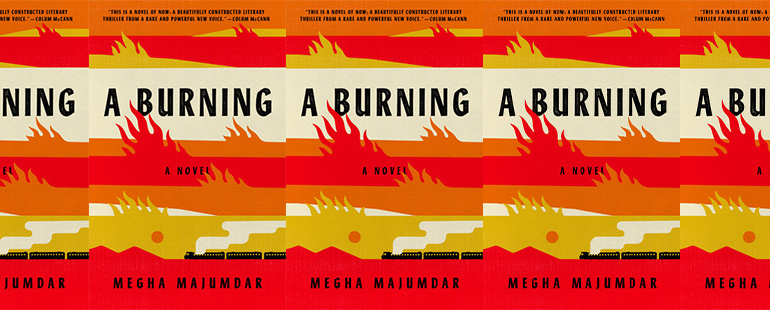A Burning by Megha Majumdar

A Burning
Megha Majumdar
Knopf | June 2, 2020
A Burning, Megha Majumdar’s rich debut novel, tracks the fate of three characters following the bombing of a train that leads to over 100 deaths in Kolkata. Jivan—a young Muslim woman, employed and moving up the ranks at a retail shop—is at the train station when the attack occurs. The novel begins the following day, when her mother, in the opening line, notes: “You smell like smoke.” And, indeed, where there is smoke, there is fire. After seeing the burning train, Jivan reads about the attack on Facebook on her first and recently purchased smartphone, then posts a comment that questions the government’s response. She is quickly arrested based on both the comment and her unrelated innocent messaging with, unbeknownst to her, a known terrorist. Major threads are unveiled, such as the shiny bright allure of technology, and the way that words can be twisted and turned back on themselves.
The other two main characters are Lovely, a hijra (a third gender in India), who wants to become an actress, and PT Sir, a high school PE teacher. Jivan tutored Lovely in English, and was on the way to a tutoring session, a bundle of books in her arms when she encountered the train on fire. PT Sir was Jivan’s PE teacher when she was at school. All three characters are outsiders at the start, each wanting to change their situation, to find a life that’s different from the one they have known. A Burning examines their desires for change and the obstacles they face, and, in so doing, beautifully portrays the world in which they live.
The book alternates among the three perspectives in short, present-tense chapters, with a clear arc that follows Jivan’s time in jail and her trial. Jivan’s chapters, written in first person, are quiet and, as the novel progresses, increasingly desperate. She interacts with prison guards and other inmates, and learns how to survive in jail. She talks with a reporter, who she believes will help her to get the truth revealed, about her life in the slums prior to being incarcerated and her desire for change: “Can you blame me for wanting, so much, to be—not even rich, just middle class?” Her chapters are lyrical with her palpable desperation to be released from prison and to be set free. At her trial, she waits impatiently to hear from Lovely, who is serving as her alibi: “I hear Lovely called to the witness box. My heart lifts, the thread of a kite unspooled, fed into the sky by the hands of a hopeful child.” The justice system then devastatingly rails against Jivan.
Lovely’s sections are also in first person and are marked by her singular and standout voice. She speaks proudly in English throughout, some of which is presumably derived from Jivan’s teaching. Her tone and voice never falter, providing a constant jolt of energy to the novel as she describes what she sees:
Now the sky is holding more light than the ground. There is a half-moon, with gray spots on it that I was never noticing before. Like the moon is having pimples also. Clouds like cotton pulled from a roll are moving under the moon, sometimes hiding it, sometimes revealing it. I am feeling that the world is so big, so full of our dreams and our love stories, and our grief too.
Lovely gives blessings to children, takes acting classes, and interacts with her community. She is keenly observant and open, providing a vivid, unfiltered window to this world. She is easy to believe in and root for, an outsider who is beginning to see success, as her acting classes lead to acting jobs. But part of being successful in this world, she discovers, is learning how to betray others, which is all the more painful to see in a character as open and vibrant as Lovely.
PT Sir’s chapters, on the other hand, are told in close third person, which allows for Majumdar to show a bit more of the world in which he travels. It also allows us to look at him more critically, as we see how his desire for a better life stems, in part, from boredom with his current job and life. Unlike Lovely, he does not begin with a passionate desire to move ahead. He attends a political campaign rally in order to catch a glimpse of a film star and is moved more by the sight of a man dancing with a dagger than by any political ideology. He ends up joining the conservative party and going to work for its candidate. It is only then, when he sees the life of luxury he has been without, that he begins to want more. Toward the end, a crowd gathers outside the candidate’s home as she wins the election: “PT Sir watches them, those common people who will always be on the outside.” As he climbs the ladder, he seemingly forgets where he has been.
Along with the three perspectives, the book also includes chapters where other peripheral characters are featured, creating a rich fullness to Majumdar’s world. While the book is the story of Jivan, Lovely, and PT Sir, it is also about everyone else. There are millions of people on the outside looking in, hoping for something just a bit better. Jivan’s parents, for example, are also given a voice. They, touchingly, always share a chapter and are only identified, collectively, as her parents. After Jivan’s mother has visited her in prison, there is a short and sorrowful moment:
In the darkness of the house, Jivan’s mother and father sit before meals of rice and yogurt, tears falling on their plates.
“It took everything I have,” says Jivan’s mother, “to smile before her.”
“I know,” says Jivan’s father, a hand on his wife’s shoulder. “I know. Eat.”
They are onlookers, unable to help their daughter, even as it is what they want most of all. We, too, feel their helplessness in their quiet moments of heartbreak.
Throughout the novel, these desires cause friction between the self and the community. Do we do what is best for ourselves, or do we do what is best for us all? A question for these times, for sure, in ways that Majumdar couldn’t have anticipated, and one that resonates loudly. As PT Sir rises in the political organization, as Lovely makes headways in her desire to become an actress, we watch Jivan sinking further and further into the prison system, even finally taken to an isolation room down many flights of stairs. We know she is innocent, and yet freedom is far from her reach. This is a world that is built on connections—who you know, whom you attach yourself to. Those who succeed know this, and always put themselves ahead of others and of the common good.
Late in the book, as Lovely prepares for a new role, she thinks: “In this world, only one of us can be truly free. Jivan, or me. Every day, I am making my choice, and I am making it today also.” Even Lovely, a character that readers grow to love and admire, chooses to leave Jivan behind, although she, at least, has some remorse. It is no accident that the novel begins with Jivan and ends with PT Sir, now a featured speaker at a rally, like the one he first attended, ostensibly caring for the masses but really only caring for himself. A Burning forces us to see the inequities in this world, and the way desire for freedom is so often thwarted, especially for those less fortunate, by those around them.



